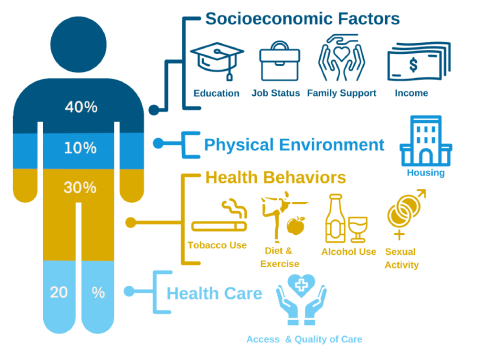Social Determinants of Health
Do you know what factors contribute to the overall health of our patients? The answer may surprise you. Studies show that 40% of an individual’s health is determined by socio-economic factors such as education, occupation, or income. 30% is determined by health behaviors such as diet, exercise, or substance use. 10% is determined by one’s physical environment, such as their community, house, or workplace. Finally, only 20% is determined by their access to healthcare and the quality of that care.

UCLA Health is committed to addressing the social determinants of health in several ways. Our community health needs assessments provide information about the needs, issues, and health status of the populations we serve. This information helps us develop a community health improvement plan by justifying how and where resources should be allocated to best meet community needs. As an anchor institution, we are committed to equity in our hiring practices, procurement of products and services from sustainable and diverse sources, and community engagement. Our physicians and community outreach teams educate our patients on healthy lifestyle habits and the importance of preventative care.
UCLA Health has also adopted LEED, or Leadership in Energy & Environmental Design as the standard for our green building practices. Our hospitals and clinics are built with patient safety as our first consideration. Our designers and architects choose building specifications that do not contain harmful chemicals of concern outlined in the Practice Greenhealth safer chemicals initiative. We address key environmental health hazards such as indoor air and water quality, and implement energy efficiency and waste reduction programs to reduce our resource consumption.